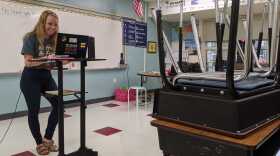The gym at Lakewood Elementary in Durham was buzzing earlier this week with families coming to pick up math workbooks, hotspots and laptops on the schoolÔÇÖs final day of device distribution.
This is the second week of virtual learning at Durham Public Schools, but distribution was delayed after shipments of Chromebooks were held up at U.S. Customs ÔÇö one of many unforeseen events in a school year marked by a pandemic.
Dia Philpott and her daughters Emma and Corrin came to school to get some tech help. Like a lot of families across North Carolina, they had trouble logging into the NCEdCloud platform this week, and received the advice they needed.
"We also got our hotspots, so now we don't have to use our mobile hotspot," Philpott said. SheÔÇÖs grateful because her phoneÔÇÖs data plan wasnÔÇÖt speedy enough for reliable class time.
Technical issues like these are just one of many reasons teachers are stressed about their students showing up to class to receive instruction ÔÇö and to get counted present for attendance.
"Attendance is everything," said Lakewood Elementary principal James Hopkins.
Attendance is crucial for learning, of course, but it also determines the number of teaching and staff positions at public schools.
Hopkins says he hates to assign dollar signs to students. But heÔÇÖs acutely aware that, in Durham, for example, state and local governments will collectively pitch in about $7,800 in ÔÇťper-pupil fundingÔÇŁ toward providing teachers, staff and resources shared by all the schoolÔÇÖs students.
ÔÇťSo anytime a student is not counted in your enrollment, that's $7,800 to $8,000 that is moved out of the school district or school,ÔÇŁ Hopkins said.
If Lakewood Elementary's enrollment is not predictable and steady, the school district could lose funding and the school could lose staff. As of now, the Lakewood has about 15 students on its roster who havenÔÇÖt attended class, or who may have changed schools.

Hopkins said Durham Public Schools is currently down about 1,500 students this semester. A district spokesman could not confirm that number, because some students are still being registered and the count is not final. If the district does lose that many students due to the pandemic, the enrollment decline would be great enough to trigger a loss in state funding.
ÔÇťWe just want to make sure that we are doing everything we can to ensure that we get as many students accounted for as possible,ÔÇŁ Hopkins said.
The key to counting students who arenÔÇÖt expected to be in the building is a two-way communication. Lakewood Elementary staff and volunteers are calling, texting and using WhatsApp to connect with students and families to work out tech problems. If they hear back, the student will get counted for the day, and caught up with their class.
Hopkins said the school district is trying to be flexible with families, because they know times are tough and the situation is still new.
ÔÇťIf a student has difficulty logging on in the morning and gets frustrated, and does not log on until 12:30 p.m., we are marking that student present,ÔÇŁ Hopkins said.
More Families May Opt Out of Public School This Year
Tech issues are just one small part of this fear of declining attendance. Bryan Proffitt is Vice President of the North Carolina Association of Educators.
ÔÇťSo the real fear is that kids are going to kind of get lost in the shuffle,ÔÇŁ Proffitt said.
Worst-case scenario, a child never even registers for school, or never once logs in for online class.
ÔÇťI suspect that if you had this conversation around the state, like, what are all the different factors that might lead to a kid not showing up? ... I'm sure there's a dozen of them that I haven't thought about,ÔÇŁ Proffitt said.

Some of the reasons students arenÔÇÖt showing up at school are because of choices parents are making during the pandemic: to homeschool their kids, to hold their kindergartner back a year or head to a nearby private school operating under a different plan.
All those things could affect public school "membership."
ÔÇťNorth Carolina public schools are funded based on student membership, not attendance, and these are often confused, but there is a difference,ÔÇŁ said Alexis Schauss, the Chief School Business Officer at the North Carolina Department of Public Instruction.
However, if a student misses enough school days, attendance can play a role in membership.
"A student is determined to be in membership on the first day that they are present at that school. And then they continue to be in membership as long as they don't have 10 consecutive unexcused absences.ÔÇŁ
Schauss says no one really knows yet how many North Carolina students have left public schools, or how many students are uncounted, because membership is calculated in September.
But the fear of declining enrollment is serious enough that earlier this week, the State Board of Education asked the legislature to hold schools harmless, meaning they wouldn't lose funding if their enrollment comes up short this fall.
ÔÇťI think the most responsible thing to do is to hold schools harmless,ÔÇŁ Principal Hopkins said. ÔÇťTo assume that during a time like this, that schools are going to maintain the same level of attendance across the state -- that's wishful thinking.ÔÇŁ
And he echoed something that's on a lot of teachers' minds -- that this year's crisis could lead to long term privatization of education.
ÔÇťMy big fear is that what you're going to start seeing are students and families stop choosing to send their kids to public schools,ÔÇŁ said Hopkins.










